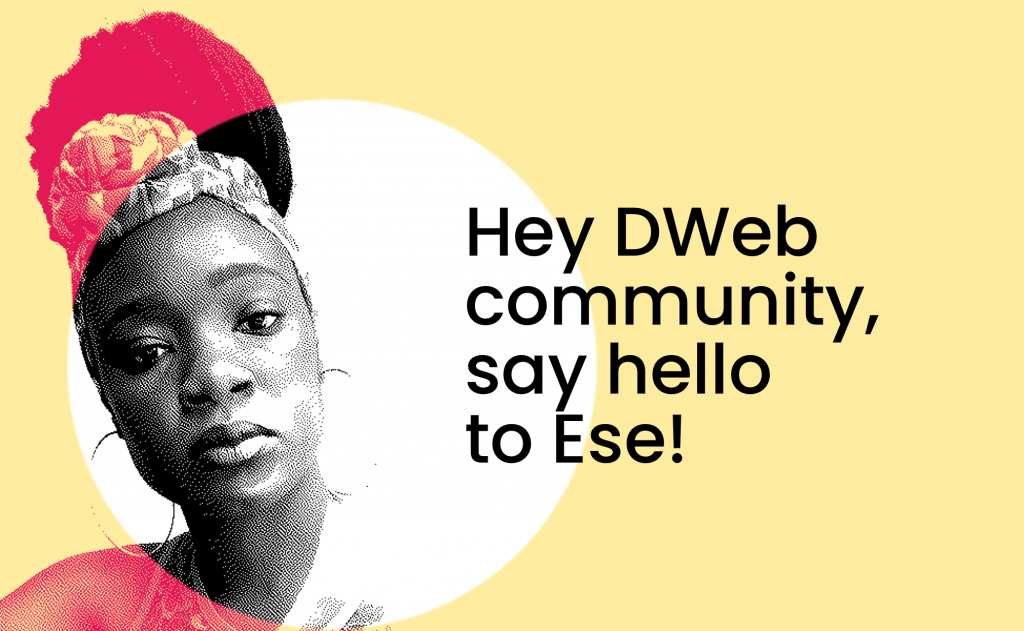
Let’s welcome Eseohe “Ese” Ojo to the Decentralized Web community! We’re thrilled to have Ese (pronounced “essay”, she/her) as the new DWeb Projects Organizer. She will be working to foster dialogue and build networks among those building a web that is more private, reliable, secure and open. She will also help steward the DWeb website as a resource hub for readings, guides, and events related to the Decentralized Web.
We did a short interview with Ese, where we asked her about her professional background, her thoughts on the connections between digital rights, human rights, and the environment, as well as what it is about the DWeb space that brings her hope.
Mai: Can you first tell us about your professional background and what you’ve been working on more recently?
Ese: I have a bachelor’s degree in International Relations and in May 2020, graduated with a master’s degree in Public Policy and Global Affairs as an African Leader of Tomorrow Scholar from the University of British Columbia. During my undergraduate studies in Nigeria, I took a combination of Law and International Relations courses and developed an interest in human rights and international law. I began working in the non-profit sector after graduation on a range of issues including digital rights, freedom of expression, access to information, academic freedom, gender, democracy, good governance and open government.
Most recently, I have worked on the Democratic Health Communications during COVID-19, the Global Platform Governance Network at the Centre for International Governance Innovation (CIGI), the Every Day Advocates and 100 Debates at GreenPAC before joining the DWeb team.
Mai: Given your background in human rights and digital policy, as well as with your current work in climate organizing, how do you think these issues are intersected?
Ese: I think these are all interconnected. I began working on environmental issues having worked on other human rights issues previously because I realised and agreed with the assertion that a safe, clean, healthy and sustainable environment is integral to the full enjoyment of other fundamental rights and freedoms.
When it comes to digital rights and right now, as I’m learning more about the decentralised web, I see a lot of parallels. I believe that the original vision for the web and the vision for the decentralized web is meant to be inclusive, private, reliable, secure, and open. It is often said and reaffirmed that “the same rights that people have offline must also be protected online.” Achieving all of this requires that special attention is paid to what harms we see offline are being reproduced online and even beyond this, what new ones are being created by these spaces. We can only achieve this if everyone in the community is committed to doing their part in small and big ways to create, protect, and defend the world and the web we want.
Mai: What aspects of the decentralized web bring you hope? Are there specific projects or examples that come to mind that demonstrate to you how decentralized technologies can better secure our human rights both online and offline?
The potential for peer-to-peer relationships and control by many rather than a select few holds a lot of promise. I am hopeful that this will bring about alternative solutions to the problems we face now and mean greater, more meaningful access for many. I also hope that this community can learn from the mistakes already made as we work together to build something better — not just in comparison to what already exists but looking beyond to fill some of the gaps too. I am still exploring projects and examples of decentralized technologies and look forward to learning more about them.
Mai: Let me ask you a final, less serious question then! What do you like to do for fun, online and offline?
If my head isn’t buried in a book, I can typically be found rewatching Downton Abbey or Pride and Prejudice. On a rare sunny Vancouver day, I enjoy soaking up some sun at the beach, park, or sea wall.